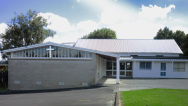|
Hi everyone,
This Sunday is Palm Sunday - the day when we celebrate Jesus' triumphal entry into Jerusalem, marking the beginning of Holy Week. Maundy Thursday - Next Thursday 21st April - we have our annual Last Supper rememberance meal at the church when we celebrate the Last Supper from a Christian perspective. This is always very interesting and enjoyable. Good Friday - 22nd April - 9:30a.m. service when we remember the crucifixion of Jesus Christ. Easter Sunday - 24th April - 9:30a.m. service when we celebrate the resurrection of our Lord. Did you know? At the Passover Seder, a hard-boiled egg dipped in salt water symbolizes both new life and the Passover sacrifice offered at the Temple in Jerusalem. The ancient Persians painted eggs for Nowrooz, their New Year celebration falling on the Spring Equinox. This tradition has continued every year on Nowrooz since ancient times. In Christian times, the egg was a symbol of new life just as a chick might hatch from the egg. The Easter egg tradition may have celebrated the end of the privations of Lent. In the Medieval Europe, eggs were forbidden during Lent as well as other traditional fast days. During the strict Lenten fast of forty days no eggs were eaten. It was traditional to use up all of the household's eggs before Lent began, which established the tradition of Pancake Day. This was because, in Christian times, the egg was a symbol of new life just as a chick might hatch from the egg. Eggs were viewed as symbols of new life and fertility through the ages. It is believed that for this reason many ancient cultures, including the Ancient Egyptians, Persians, and Romans, used eggs during their spring festivals. In Eastern Christianity, both meat and dairy are still prohibited during the fast, and eggs are seen as "dairy" (a foodstuff that could be taken from an animal without shedding its blood). That is the reason why eggs laid during that time were often boiled or otherwise preserved. It was during Easter that the consumption of eggs resumed after the strict Lenten fast. Eggs were thus a mainstay of Easter meals, and a prized Easter gift for children and servants. And this is probably the reason why eggs came to be associated with Easter. SOURCE: theholidayspot.com
0 Comments
|
All blog content © 2016 St. Andrew's Presbyterian Church, Henderson
Archives
September 2016
Categories
All
|


 RSS Feed
RSS Feed
